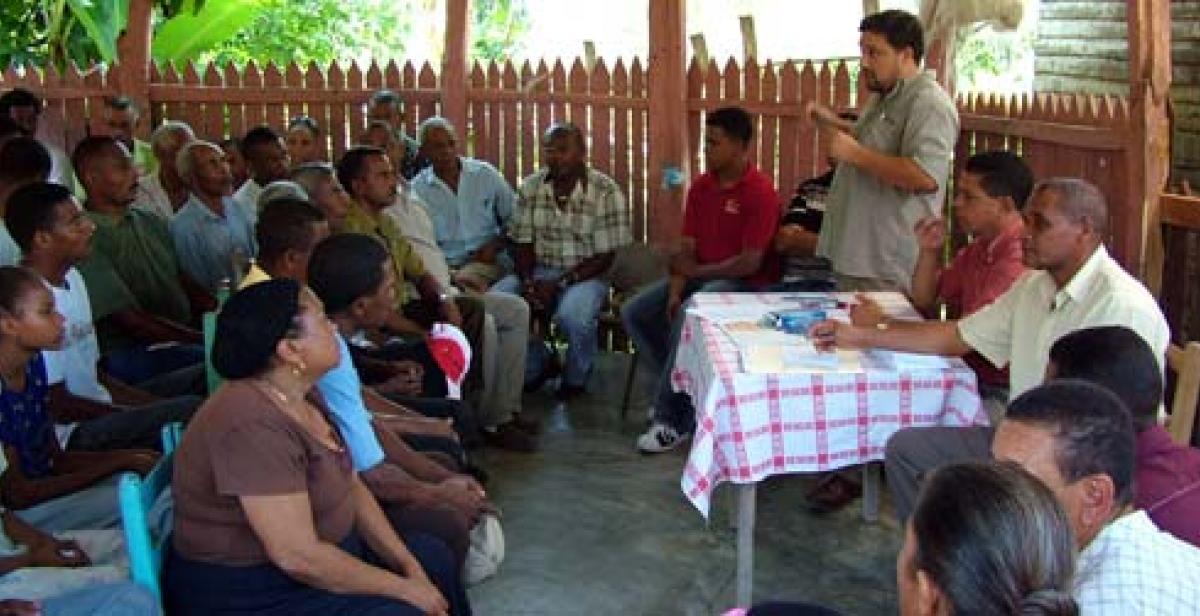Fernando giving a presentation at a meeting in the town of Altamira in the Dominican Republic.
Fernando Umaña, from Chile, was a development worker with Progressio from November 2005 to November 2011.
What have you done since leaving Progressio and what do you do currently?
When my placement with Progressio ended, I returned to Chile to the city of Punta Arenas, where I worked independently doing consultancy work. I am currently working for the Ministry of Housing and Town Planning’s Regional Secretariat in charge of social sector programmes, and I also teach at a university.
Please describe your role and the partner organisation that you worked with as a Progressio development worker
I worked at Fundación Solidaridad in Santiago de los Caballeros, where I advised local governments in the north of the country on citizen participation processes. In particular, I advised on the development of the strategic plan for the municipality of Altamira, and on the implementation of participatory budgeting. I also monitored other projects run by Fundación Solidaridad, such as the Citizens’ Watchdog and training workshops for leaders of local organisations.
After that, for three years I coordinated a project through the regional office of Federación Dominicana de Municipios (FEDOMU) - the Asociación de Municipios de la Región Cibao Norte. This focused on the development and implementation of Municipal Development Plans, which are currently being replicated at national level in most of the country’s municipalities.
What inspired you to become a development worker?
My professional training as an Anthropologist compelled me to take this opportunity to get to know a different culture to that of my own. That, together with the encouragement and support of my partner, drove me to make the decision to become a development worker.
I should say though that it was just the first step in a big journey, taking me to the Dominican Republic for a year and a half the first time. I later applied again because I liked the experience and was left wanting more, and the placement was extended for another six months. The experience has left a huge impression on my life.
What struck you most about Progressio’s development worker model?
The freedom of the work. Even when the work is carried out in line with objectives you can adjust the mechanisms or strategies according to what is needed at each stage of the process. The local staff’s experience, along with your own, means you have to keep adjusting your step, with the beneficiaries’ support, to arrive successfully at your destination, which is an enormous advantage. Each decision is not your decision, it’s the decision of all those who are part of that experience. Everyone has something to say and we listen to everyone. That way we reinforce our actions, and whilst we guide, listen and clarify, the ones who really decide are those who own those projects and actions.
What did you enjoy most about your role, and of your experience as a development worker?
Learning about the Caribbean culture in great depth. My Dominican friends taught me to give life more meaning and give myself time to enjoy the simple things in life.
What were some of your main achievements while working as a development worker?
One of the main objectives of partnerships is to share knowledge; something that is not so easy to do but which is happening all the time and takes many forms. A couple of years after I left the Altamira Municipality’s Participative Budgeting Project, it was functioning independently with only local staff maintaining and improving the action and achievement rates, which made me feel very pleased with the work. They no longer needed my professional experience, although they always say otherwise.
The other great success has been the implementation of the PLANIFICA project. This project was planned at a municipal level, piloted in municipalities in the north of the country, and is now being implemented at a national level. We worked with a big team of Dominican professionals who took this idea from square one, where it was only mentioned in Dominican municipal law and had never been implemented, and transformed it into a reality through planning, the development of manuals, creation of development plans, and training. In the end, this has been a big process, which is now nationwide, and which for those of us who worked on civil development has been an unforgettable experience.
And what were some of the key challenges and lessons learnt?
Disillusionment with politics is a very serious problem for those of us who work in citizen participation processes. Citizens have lost faith in democratic mechanisms and in those who represent them, which creates a context which is not very favourable for creating links between citizens and authorities. However, trust is the most important driver upon which any democratic exercise is built and the challenge in this instance was to rebuild that aspect of exercising citizenship.
When the authorities enable participation and share power, and citizens trust the authorities’ intentions again, democracy is achieved and can flow naturally. This seems like an alien concept in our time, but it is possible. Participative budgets on a global level are a reality, but they are only real when there is the political will to build real processes, not constructed from thin air but with the people and for the people.
What advice would you give to someone who is thinking of becoming a development worker?
That they should dare to take the leap. The opportunity to work in another country is very important in professional terms, but above all the satisfaction of sharing and learning with people from other cultures is incredibly valuable. You won’t regret it.



